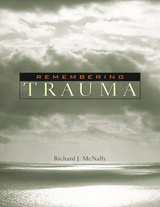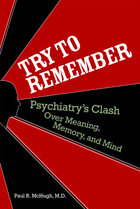

Sketching out the scientific foundations for a unified theory of repression that integrates the findings of the laboratory and the clinic, this comprehensive and authoritative synthesis of a century of memory research will be crucial reading for psychologists and clinicians, as well as forensic and legal professionals interested in the recovery of "inaccessible" memories.
"By debunking hypnosis, [Erdelyi] has allowed the debate on memory to move forward. . . . Erdelyi's work on hypermnesia is very important to our understanding of the mechanisms of memory and the brain."—Janet D. Feigenbaum, Times Literary Supplement

Are horrific experiences indelibly fixed in a victim’s memory? Or does the mind protect itself by banishing traumatic memories from consciousness? How victims remember trauma is the most controversial issue in psychology today, spilling out of consulting rooms and laboratories to capture headlines, rupture families, provoke legislative change, and influence criminal trials and civil suits. This book, by a clinician who is also a laboratory researcher, is the first comprehensive, balanced analysis of the clinical and scientific evidence bearing on this issue—and the first to provide definitive answers to the urgent questions at the heart of the controversy.
Synthesizing clinical case reports and the vast research literature on the effects of stress, suggestion, and trauma on memory, Richard McNally arrives at significant conclusions, first and foremost that traumatic experiences are indeed unforgettable. Though people sometimes do not think about disturbing experiences for long periods of time, traumatic events rarely slip from awareness for very long; furthermore, McNally reminds us, failure to think about traumas—such as early sexual abuse—must not be confused with amnesia or an inability to remember them. In fact, the evidence for repressed memories of trauma—or even for repression at all—is surprisingly weak.
A magisterial work of scholarship, panoramic in scope and nonpartisan throughout, this unfailingly lucid work will prove indispensable to anyone seeking to understand how people remember trauma.

In this thought-provoking account, McHugh explains why trendy diagnoses and misguided treatments have repeatedly taken over psychotherapy. He recounts his participation in court battles that erupted over diagnoses of recovered memories and the frequent companion diagnoses of multiple-personality disorders. He also warns that diagnoses of post-traumatic stress disorder today may be perpetuating a similar misdirection, thus exacerbating the patients’ suffering. He argues that both the public and psychiatric professionals must raise their standards for psychotherapy, in order to ensure that the incorrect designation of memory as the root cause of disorders does not occur again. Psychotherapy, McHugh ultimately shows, is a valuable healing method—and at the very least an important adjunct treatment—to the numerous psychopharmaceuticals that flood the drug market today.
An urgent call to arms for patients and therapists alike, Try to Remember delineates the difference between good and bad psychiatry and challenges us to reconsider psychotherapy as the most effective way to heal troubled minds.
READERS
Browse our collection.
PUBLISHERS
See BiblioVault's publisher services.
STUDENT SERVICES
Files for college accessibility offices.
UChicago Accessibility Resources
home | accessibility | search | about | contact us
BiblioVault ® 2001 - 2024
The University of Chicago Press









